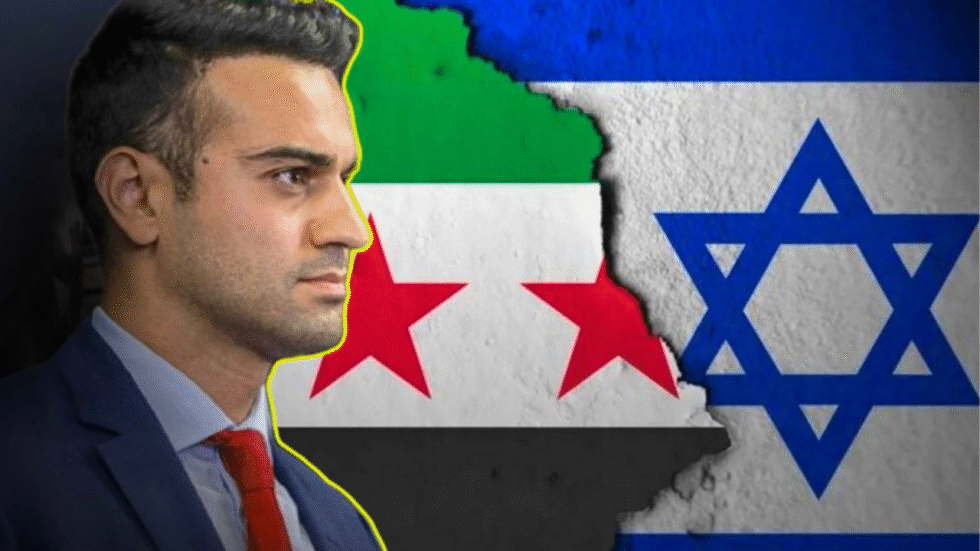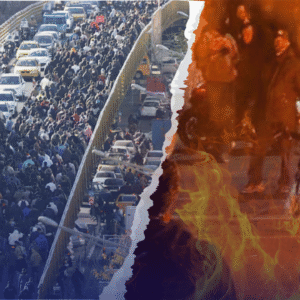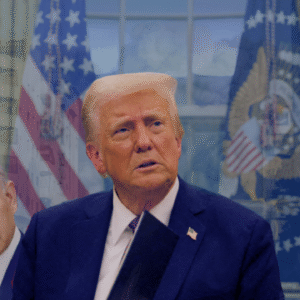Hamadeh’s Syria Visit Exposes U.S.-Israeli Coercion Behind ‘Shuttle Diplomacy’

For the first time in decades, a U.S. intermediary has shuttled between Syria and Israel, initiating indirect negotiations between the two sides.
Congressman Abraham J. Hamadeh traveled from Jerusalem to Syria on Aug. 10 to visit Syrian President Ahmad al-Sharaa and Foreign Minister Asaad Hassan al-Shaibani.
His trip, which followed a meeting with Benjamin Netanyahu and Druze leader Sheikh Mowafaq Tarif in Tel Aviv, marked a revival of U.S. shuttle diplomacy: a move that masks political theater, using the guise of diplomacy to coerce a weaker, unstable state to fulfill imperial demands.
U.S. Demands for Syria’s Normalization
Hamadeh is a member of the House Armed Services and Veterans’ Affairs committees, and a Republican supporter of Trump’s America First agenda. He is the co-author of the bipartisan Promoting Education on the Abraham Accords for Comprehensive Engagement (PEACE) Act.
His work centers on diplomatic training on the Abraham Accords and normalization agreements in the State Department.
Hamadeh’s trip covered related demands to ensure Syria’s progression toward normalization. After addressing the return of Kayla Mueller’s body to Arizona, the congressman urged Syria to join the Abraham Accords. Mueller (1988-2015), an American aid worker, was abducted by ISIS in Aleppo in 2013.
Hamadeh, whose mother is from Suwayda, advocated for a united Syria that safeguards minority rights. He discussed the establishment of a humanitarian corridor to ensure the delivery of medical and humanitarian aid for Suwayda.
Praising the efforts of U.S. Special Envoy to Syria Tom Barrack, Hamadeh expressed support for the lifting of “some” sanctions over the new government. In exchange, he reminded Syria of its commitments to U.S. demands in this transitional period. In other words, Syria is expected to submit to normalization ultimatums in return for a fragile reassurance of a secure livelihood for its citizens.
Days before his visit to Syria, Hamadeh met with Netanyahu in Tel Aviv to discuss regional concerns for Israel’s security. He then met with Druze leader Sheikh Mowafaq Tarif to discuss the sanctity of the Druze community in southern Syria.
Reviving ‘Shuttle Diplomacy’ in the Region
The term “shuttle diplomacy” was first coined by the office of U.S. Secretary of State Henry Kissinger in the 1970s. During the Yom Kippur War, Kissinger traveled between Israel and the engaged Arab countries to facilitate negotiations and bridge demands.
This form of diplomacy allows disputed parties to engage indirectly when direct communication is not possible due to regional tensions or lack of recognition. As such, Hamadeh’s trip is an attempt at reviving shuttle diplomacy between Israel and Syria, positioning the U.S. as an intermediary “third party.”
The structure of diplomatic engagement between Syria and Israel is largely a feature of Syria’s transitional phase. Given Syria’s limited leverage, the weaker state faces impositions by the American administration rather than an exchange of demands under a balance of power.
The trip, therefore, exports imperial interests onto Syrian territory, compelling the regime to normalize with Israel and respond to Western pressures. As the region is gradually pushed toward normalization, third-party mediation is a temporary charade — a facade for direct communication.
Since mid-May, senior Syrian security official Ahmed al-Dalati has led several rounds of direct, in-person meetings with Israeli counterparts aimed at easing border tensions—raising questions about whether the new Syrian regime can effectively ensure national security while maintaining a confrontational posture.
This dual approach highlights the fragile nature of Syria’s transitional phase, where gestures toward dialogue coexist with a confrontational stance as the regime navigates external pressures and seeks to maintain authority at home.
Advancing Trump’s ‘Peace Through Strength’
Hamadeh’s trip aims to advance Trump’s Peace Through Strength foreign policy. The doctrine promotes military and economic power to deter aggression from potential adversaries. It claims to preserve peace and prevent war in the long run.
The concept is attributed to figures such as George Washington and Ronald Reagan. In Reagan’s term, the buildup of the U.S. military toward the Soviet Union was justified under this doctrine. The idea suggests that a willingness to use military power discourages other nations from initiating conflict.
Negotiation under such a policy is hard diplomacy backed by military force. Against a relatively weaker nation, diplomacy simply becomes an extension of the stronger state’s demands. In this case, Syria is forced to comply with the U.S.-Zionist agenda for the sake of survival, where the cost of resistance is set to be too high.
However, this narrative stems from the U.S.-imposed overthrow of the Assad government, which stood as a strong adversary for American influence in the region. Supporting the Jolani regime while criticizing Zionist aggression is self-defeating, given the new regime’s openness to peace with Israel and Israel’s complicity in setting up the system.
Taken together, these developments suggest that Washington’s strategy is less about fostering genuine peace than about engineering a regional order aligned with U.S. and Israeli interests.
By weakening Syria’s capacity to resist and promoting a regime willing to normalize with Israel, the U.S. has transformed diplomacy into a tool of coercion, raising doubts about the future of Syrian sovereignty and the broader struggle for regional independence.
If you value our journalism…
TMJ News is committed to remaining an independent, reader-funded news platform. A small donation from our valuable readers like you keeps us running so that we can keep our reporting open to all! We’ve launched a fundraising campaign to raise the $10,000 we need to meet our publishing costs this year, and it’d mean the world to us if you’d make a monthly or one-time donation to help. If you value what we publish and agree that our world needs alternative voices like ours in the media, please give what you can today.















